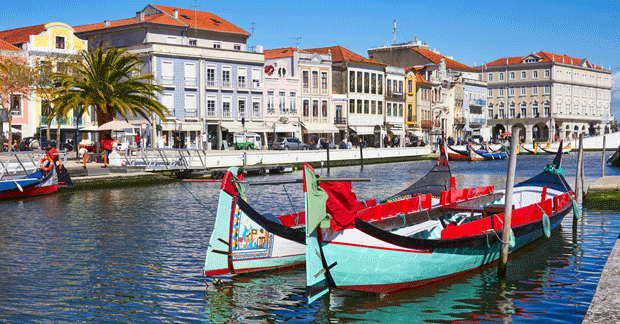In association with: Visit Portugal
Experience the country’s scenic splendour and varied landscapes with a range of sustainable activities
From birdwatching in Peniche and the Ria de Aveiro (a coastal lagoon), to cycling the trails of BioRia, finding sustainable activities in the Centre of Portugal is easy. The archipelago of the Berlengas, a Unesco Biosphere Reserve, offers guided hikes to see flora that’s unique to the islands.
On the mainland, a huge rewilding project is under way in the Côa Valley. This sustainable practice has seen much of its wildlife return to the area, including deer and the Iberian wolf. And in the Serra da Estrela Natural Park, heritage conservation includes handmade cheese manufacture and support for beekeepers.
Sustainability-focused lodgings – powered by renewable energy and committed to cooking with local produce – are plentiful, for those who wish to stay in the region’s beautiful mountain villages.
Night-time appeal
With one of the lowest population densities in Europe, the Alentejo region is perfect for stargazing, and as such is the perfect home for Dark Sky Alqueva, the first starlight tourism destination in the world.
Stargazing sessions are accompanied by other night-time activities such as astrophotography and night tours by canoe, but there are many appealing daytime activities too. Alentejo is also a leading wine region and has been praised for a sustainable production method that includes sheep helping to weed fields.
Staying at a hotel vineyard is a great way to experience and learn about both activities, with much of the accommodation incorporating sustainable initiatives and authentic rural traditions.

3 of the best sustainable hotspots
1. Marialva, Centre of Portugal
The village of Marialva is a great base from which to visit the Côa Valley by solar-powered electric boat. The rewilding programme is just one reason to visit this beautiful valley.
2. Aveiro, Centre of Portugal
Known as the ‘Portuguese Venice’, Aveiro offers free bikes to explore attractions such as the Vista Alegre Factory, where artisans still make porcelain. A trip on the Santa Maria Manuela, a four-mast lugger built in 1937, is unforgettable.
3. Evora, Alentejo
Traditional craft skills are alive and well in this historic city with shops and a handicraft museum showcasing furniture and tableware made from local materials such as clay, iron, cork and leather.
PICTURES: Monica Gumm; Shutterstock/Portumen

Find out more at visitportugal.com
